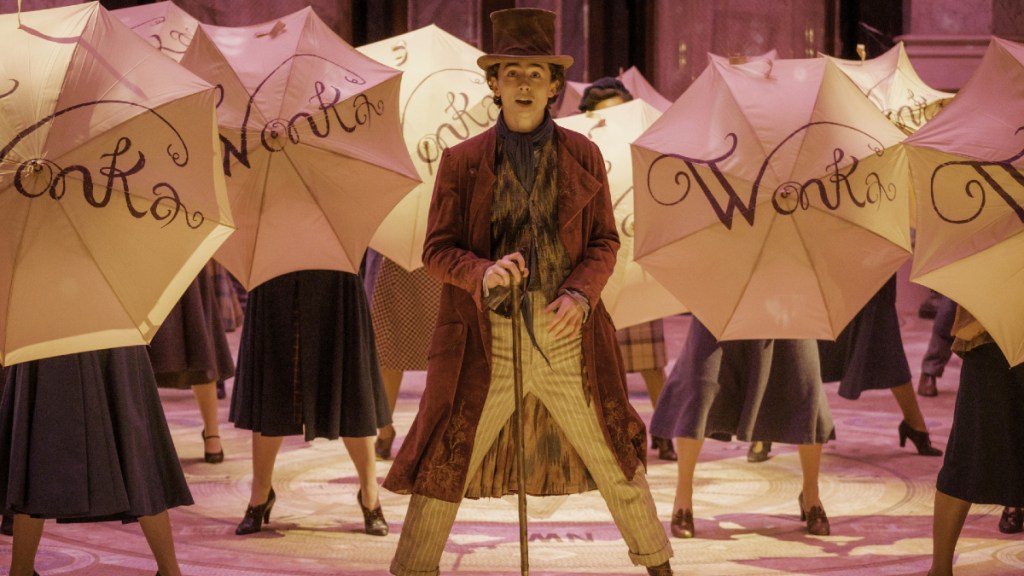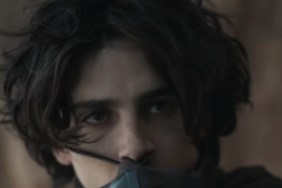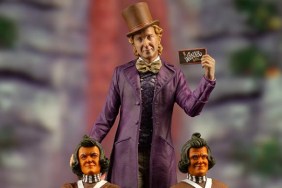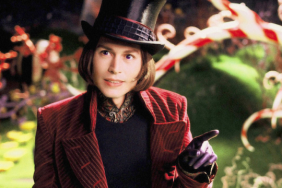Let’s be honest: we all probably thought Wonka was a terrible idea. The notion of a musical prequel to Willy Wonka and the Chocolate Factory, based on no backstory Roald Dahl ever wrote, always seemed like a cynical way to exploit the one part of the Dahl IP Netflix doesn’t own outright — the original Mel Stuart movie. It-boy Timothee Chalamet seemed like he would have to be either desperate for a huge payday or seriously miscast, and let’s not even get into the potential controversy over a full-sized actor, Hugh Grant, playing an Oompa Loompa. Like Willy Wonka’s three-course meal chewing gum that infamously turned Violet Beauregard into a human blueberry, all the ingredients seemed both wrong and primed for a disastrous outcome.
“Stop. No. Don’t.”
Shockingly, Wonka is actually good. Or maybe that’s no shock at all if you’re a fan of director Paul King’s Paddington movies and would like more of that kind of tone: sweet but not cloying, whimsical without being twee, and including real stakes without getting too unacceptably scary for kids. Without going back to the original books and skipping the Tim Burton interpretation altogether, Wonka is mostly a direct prequel to Willy Wonka and the Chocolate Factory, though not everything lines up exactly. Slugworth, for example, is now Black.
Yet Chalamet, whose boy-band looks are off-putting but misleading, is closer to the Wonka of the books than any previous cinematic incarnation. Gene Wilder, Johnny Depp, and any number of creepy cosplayers like Marilyn Manson have contributed to the cultural idea that Willy Wonka is a scary or psychotic character, at least once you get past the surface, but that’s all been actor interpretation. In Dahl’s books, the only people harmed by any of Wonka’s creations are repulsive, reprehensible characters who — as in most of the author’s children’s books — karmically get what’s coming.
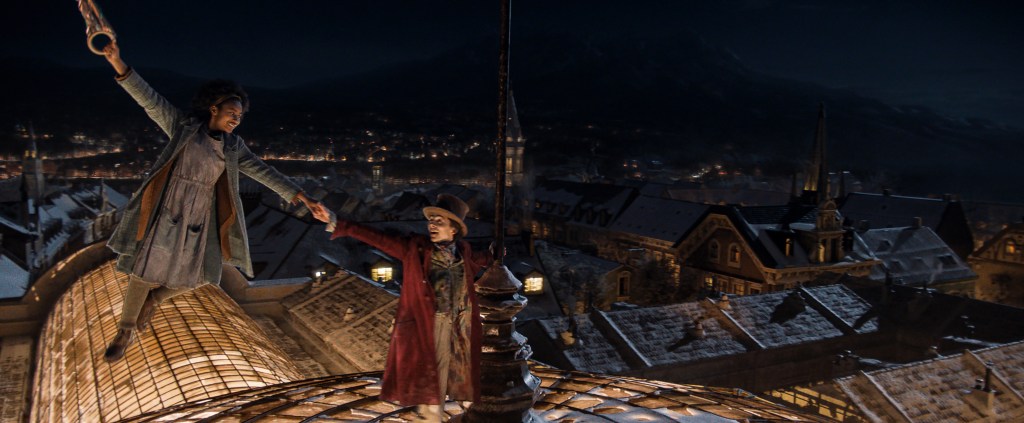
Wonka himself is fatherly, brilliant, and a wee bit manic, but he only causes problems when others abuse his creations. That’s exactly how Chalamet portrays him — he may look a bit young to be fatherly, but his relationship with a young orphan named Noodle (Calah Lane) offers him the chance to showcase the same sort of mentorship ability he will someday share with Charlie Bucket.
(Dahl probably envisioned Wonka as English, but that ship has long since cinematically sailed.)
Fantastic Treats and Where to Find Them
Like Newt Scamander in the less-successful prequels to a Dahl-inspired British children’s book, Wonka carries with him a suitcase with TARDIS-like inner dimensions, full of eccentric ingredients for creating the perfect candies. Returning from years at sea to an unspecified country that appears to be a mashup of England and Germany, he quickly finds his pocket money dwindling to nothing. Taking shelter at Mrs. Scrubbit’s Laundry, he is assured by the dubious proprietress (Olivia Colman) that he can stay one night for deferred payment. Naively still believing in the innate goodness of humanity after years of global adventure, somehow, he fails to read the fine print or the room. Soon thereafter, he finds himself having to work off a litany of hidden charges, locked in the basement with many others who fell for the con over the years.
If he could only get out long enough to sell some of his superior chocolates, he might earn the money to buy out his contract. Yet therein lies another problem: a Big Chocolate cartel led by Slugworth (Paterson Joseph), Prodnose (Matt Lucas), and Ficklegruber (Mathew Baynton), whose surname reference to Hitler’s grandmother, Maria Schicklgruber, tells you all you need to know about his character. They’re also in league with the church and local PD, most of whose members have become addicted to chocolate — but only the good kind that the cartel reserves for its best allies. It’s mediocre cocoa for the general public, but populist Wonka believes top-notch chocs should be affordable for all. Therefore, he must be eliminated.
Living Dahl
There’s much of Dahl’s spirit in the grotesque villains, abuses of capitalism 101, and the near Dickensian punishments children must endure until a kind soul more powerful than awful adults unleash their joy. The songs are solid and sing-along friendly, too — unlike in Disney’s recent Wish, they repeat memorable choruses and engage in amusing wordplay and near-wordplay. Fans of the Sherman brothers’ “A constable’s respons-table” lyric for Mary Poppins may enjoy many similar malapropisms herein. Fans of stage musicals may even object that there aren’t enough songs — like many animated musicals, Wonka uses the numbers more as punctuation than narration, and most could be excised without altering the plot to any significant degree.
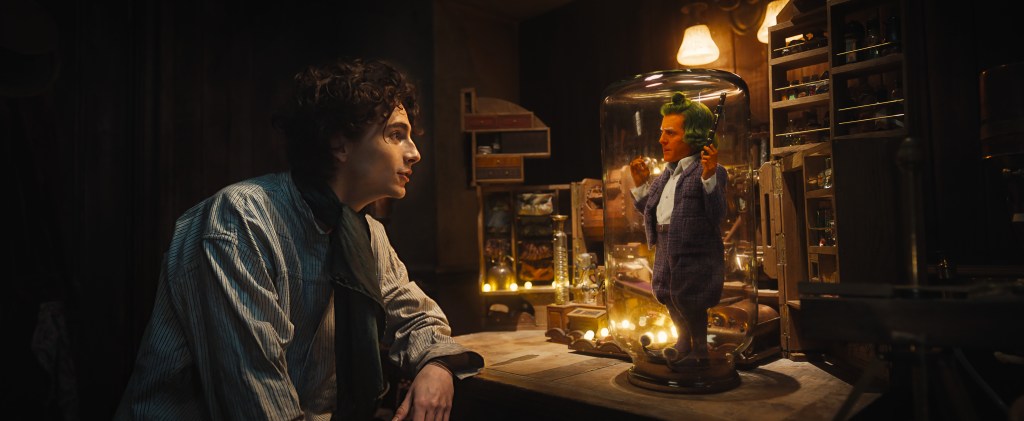
Wonka also resorts to cheap pops from the use of two familiar numbers — “Oompa-Loompa” and “Pure Imagination” — which bring out all the feelings when the narrative threatens to slow down. In the former case, it’s canon: these Oompa Loompas always bust out the same song when delivering a lesson. In the latter, it’s arguably overkill to sing twice, and yet, embarrassingly, it works completely. It would take a viewer of sterner stuff than I to remain stoic, especially given the context that’s too good to spoil.
A Golden Day?
Reminding us that this is (distantly) derived from a storybook, King mixes up the visual style with painterly rotoscoping for some flashbacks and animated drawings onscreen to periodically emphasize plot points. It’s a children’s book approach that works, along with clever use of silhouettes and light. Most importantly, the chocolates, made from such unlikely ingredients as giraffe milk and the tears of a clown — Wonka is like the world’s greatest Chopped contestant — look irresistible. If Warner Bros. aren’t on the ball enough to send lookalikes to the movie theater concession stand, they’re leaving silver sovereigns aplenty on the table. (Gummys don’t count!)
The movie’s not without problems — the heist sequence that serves as climax feels contrived and gratuitously “movie-esque” rather than book-charming, and as a prequel, Wonka makes the usual mistake of filling in every gap to set up the original, even though there’s plenty more time that has to elapse. If a person thinks too hard, they might also wonder what becomes of all Wonka’s new friends in this film between now and the arrival of Charlie. Eaten by Vermicious Knids, perhaps? Best not to think too logically about this being a prequel, though candy gods help us if WB decides this is a reboot and Willy Wonka needs remaking.
Regardless of what happens next, in Paul King I trust. His pure imagination made a basket of leftovers into a tasty holiday treat this time around; give him the golden ticket to do whatever he wants next.
Grade: 4/5
Wonka opens in theaters on December 15.
